What to Do When Your Water Heater Is Making Noises
Identify the cause of the noise, then take steps to rectify the problem
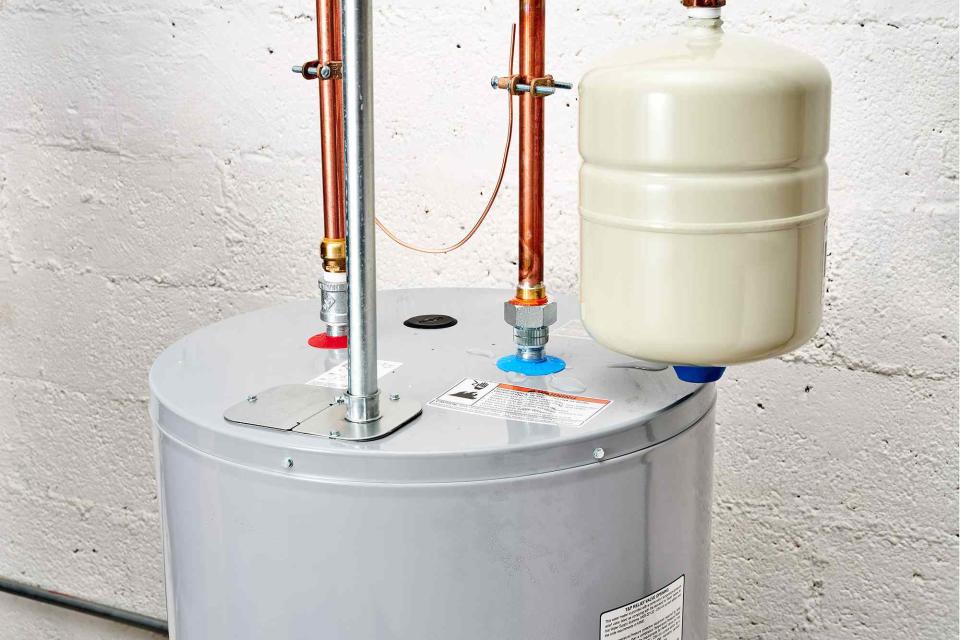
The Spruce / Kevin Norris
Reviewed by Richard Epstein
When a home's water heater starts making noise, diagnosing and handling the problem can be difficult, especially if the noise is inconsistent. A water heater has the critical job of heating the home's cold water, making it available for showering, sink faucets, dishwashers, and clotheswashers.
When you hear sizzling, hissing, and crackling noises, it can signal sediment buildup in the tank. Annual maintenance, such as flushing and draining the tank, prevents this problem from occurring and prolongs the need to replace the water heater.
Keep reading to better understand the noises a water heater can make and what they mean.
Warning
DIYers should avoid working on a water heater. Unexperienced people will have difficulties diagnosing and fixing a leaking gas line, vent line (called breaching), scalding, or averting a potential flood.
Common Water Heater Noises and Causes
There are several types of water heaters, including tankless, point-of-use, solar, and more. These common water heater noises are mainly related to tanked water heaters—particularly gas or electric.
Rumbling
Sediment build-up is a regularly occurring issue with hot water tanks, especially if you live in areas with hard water. These mineral deposits settle inside the tank, causing a range of problems. When the water in the tank heats and expands, it pushes through the sediment to the top of the tank, which causes the sediment to shift against the sides and bottom of the tank, resulting in a rumbling sound.
Experienced DIYers may be able to flush and drain the hot water tank with a long hose to remove the sediment, or you could try using a descaling solution to break down the limescale within the tank.
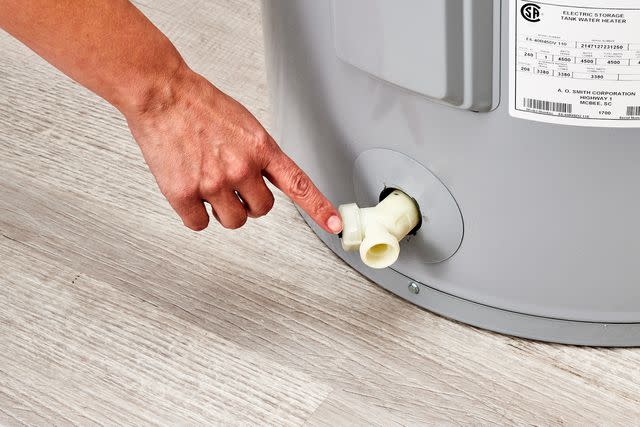
The Spruce / Kevin Norris
Popping
Popping, like rumbling, is most often caused by limescale and sediment build-up within the tank. The sound is created when steam bubbles form under the sediment and burst as the water heats up. A quick solution is to use a descaling product to help break down the limescale and minerals, but it may be better to flush and drain the tank to remove any built-up sediment.
Additionally, popping sounds can be caused if an aluminum anode rod within the tank is exposed to high alkalinity levels. A plumber can diagnose and fix this issue.
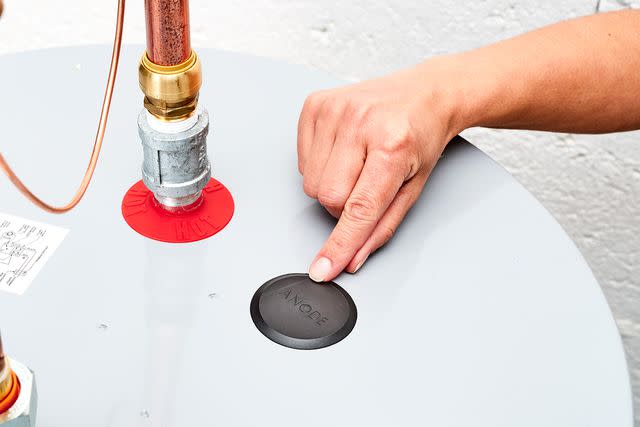
The Spruce / Kevin Norris
Sizzling, Hissing, or Crackling
Sizzling, hissing, and crackling are sounds more commonly heard from electric water heaters. They are typically attributed to sediment build-up in the base of the tank, which can be addressed by annually flushing and draining the water heater. These sounds occur when the lower heating element is buried by sediment.
However, irritating noises aren't always the only symptom of this problem. Expect the heating bills to go up as the water heater struggles to heat the same amount, with a significantly reduced ability to produce heat from the lower heating element.
Sizzling sounds coming from a gas-powered water heater can be a problem. Sizzling sounds in a gas water heater are caused by internal condensation, which makes a sizzling sound when it drips down onto the burners. The formation of condensation in the tank could be a sign of a leak within the tank. Contact a plumber to inspect the tank.
Ticking
Changes in water pressure, efficiency-boosting heat trap nipples, and loose pipe straps can all cause ticking noises in and around the water tank. The good news is that most of these issues are harmless.
As long as changes in water pressure are not frequent and dramatic (like rapidly opening and closing the main building control valve), then this won't cause any damage to the system. Similarly, efficiency-boosting heat trap nipples improve the functionality of the water heater. However, if the ticking sound is irritating, these parts can be switched out for non-heat trap nipples.
Loose pipe straps aren't a serious issue, but fixing this problem by tightening or replacing them is a good idea. This will stop the ticking sound and also prevent the pipes from shifting. Alternatively, lowering the heat by a few degrees may reduce the expansion of the pipes and stop the ticking.
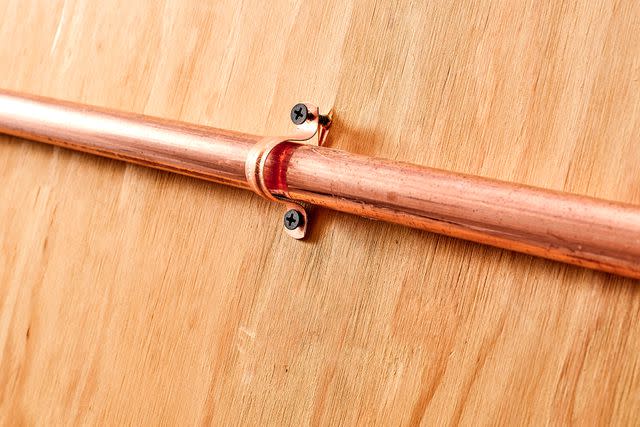
The Spruce / Kevin Norris
Screeching, Screaming, or Singing
Any high-pitched noises like the whistling of a boiling stovetop kettle would fall into this screeching, screaming, and singing category. These sounds are typically produced when water flow through a valve is significantly restricted.
The first thing to do is check the temperature and pressure relief valve that is usually located on the side of the water tank. This valve allows water to escape the tank if the pressure is too great. If the source of the sound is this relief valve, immediately turn off the gas, electricity, and water in the tank and call a plumber.
If the sound isn't coming from the temperature and pressure relief valve, it may be from the inlet valve, the outlet valve, or nearby water lines. Ensure that any valves are fully opened, and check the lines for any kinks or deformations that may be restricting the water flow. Call a plumber to help rectify the situation if the lines are damaged, or the sounds continue.
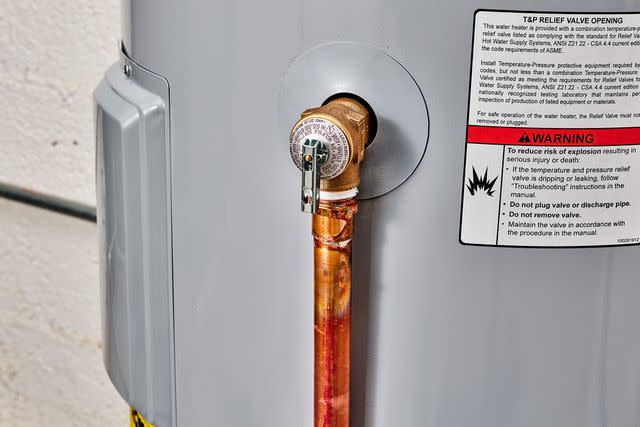
The Spruce / Kevin Norris
Banging or Hammering
Water hammer refers to a banging or hammering sound produced by the plumbing system when the water is forced to stop or change direction abruptly, resulting in a pressure surge within the system. Water hammer can potentially burst pipes in the home and could even lead to the expansion and deformation of the water tank. You may need a water hammer arrestor or pressure-reducing valve to address recurring issues.
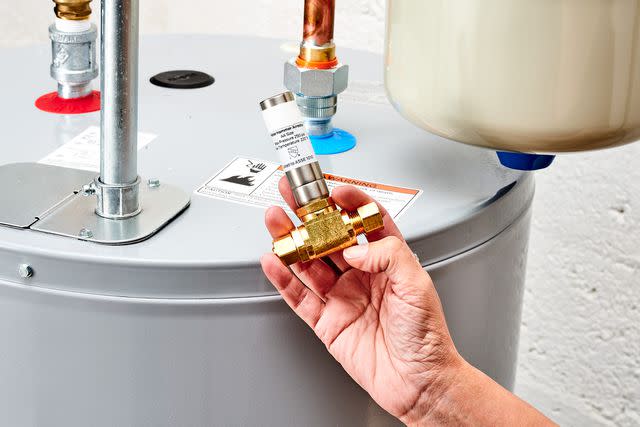
The Spruce / Kevin Norris
How to Prevent Sediment Buildup
Sediment buildup can be unavoidable if you live in an area with hard water or many minerals in your water supply. Using a water softener regularly can reduce the minerals in your water supply and potentially prevent sediments from collecting in your water tank.
However, annual flushing and draining of your water tank is recommended as the best way to prevent sediment from remaining inside. If white scale sticks to the heating element, it affects the heater's ability to heat efficiently. It can also clog the tank's drain valve, creating a safety hazard.
When to Call a Professional
Most problems with a water heater should be dealt with exclusively by a professional trained to work with hot water tanks. A professional plumber should perform annual maintenance tasks of flushing a hot water tank, particularly if you are not experienced with plumbing.
When a water heater makes a popping sound, it likely requires the replacement of the aluminum anode rod with a magnesium anode rod. Likewise, a professional must inspect a crackling or popping sound that might indicate condensation forming inside a water tank. Very loud screeching or screaming sounds from the water heater need immediate action, so turn off the water and tank's power source (gas or electricity) and contact a specialist.
Similarly, a hammering sound in your water system may not be a problem with your water heater; however, it indicates a potential water pressure issue that a professional should address.
Frequently Asked Questions
Should I be concerned about my water heater making a noise?
Water heaters can make different noises; some are harmless, but others, like screaming or a high screeching sound, can be serious signs that need immediate plumber attention.
What does it sound like when your water heater is going out?
If you hear popping, banging, or rumbling, it can be a sign that your water heater is about to fail. A water heater's average lifespan is between eight and 12 years; longevity depends on how well you maintain your tank over those years.
How do you know if your water heater is about to burst?
Signs of an imminent tank rupture include water leaking from the pressure relief valve, loud popping sounds, brown water from the faucet, or a rotten egg smell near the water heater. Turn off the water and power source and contact a plumber immediately.
What is the life expectancy of a water heater?
A tanked water heater can last up to 12 years, while a tankless unit lasts longer, roughly 20 years on average. The cost to replace a water heater averages about $1,000.
Read the original article on The Spruce.

